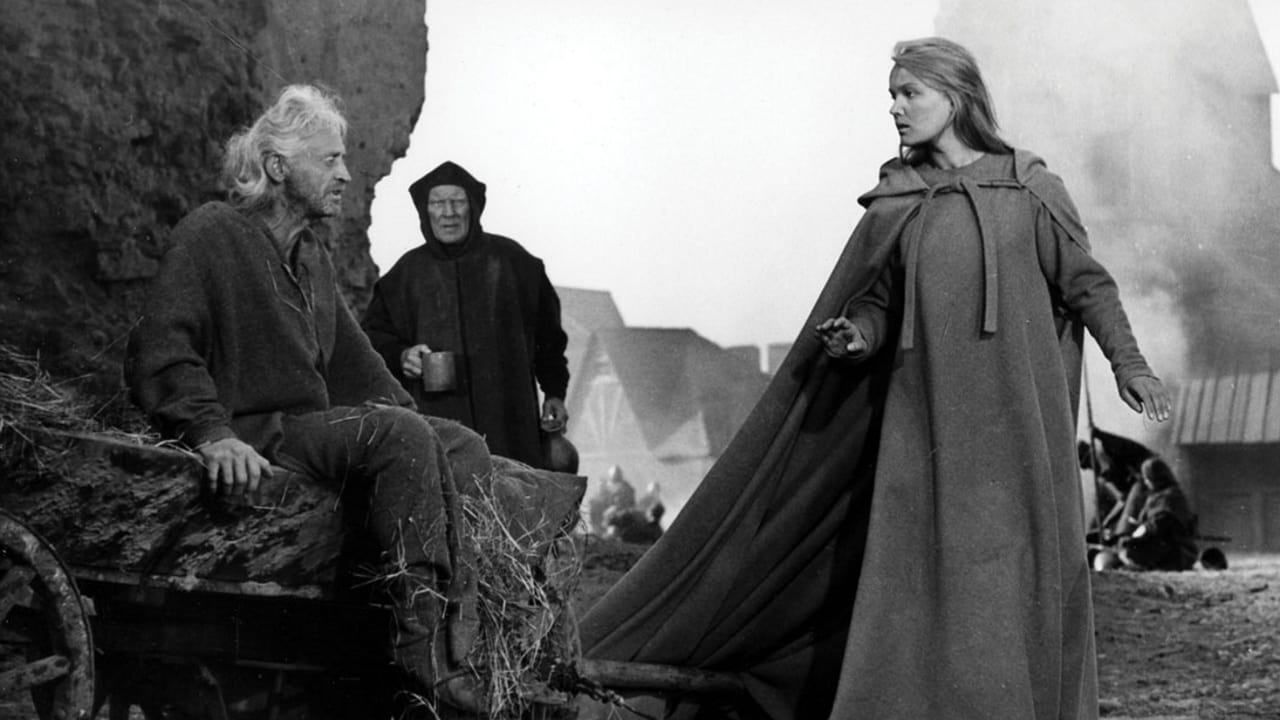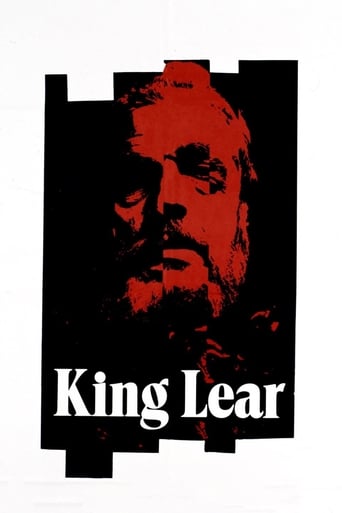

Who payed the critics
... View MoreBrilliant and touching
... View MoreThe first must-see film of the year.
... View MoreStrong acting helps the film overcome an uncertain premise and create characters that hold our attention absolutely.
... View MoreKing Lear is a very complex and powerful tragedy, and therefore adapting it is difficult. Peter Brook's 1971 film, shot in black and white, actually does a great job and summons up most of the titanic power of its source material. This has been a divisive film, and I can partially see why. With its drained, melancholy black and white cinematography, gloomy line delivery, subtle camera movements and dark, nightmare-like atmosphere, this does not hold back at all in its bleakness, and is not for the faint of heart. This is one highly nihilistic movie, so do not watch this for a good time. Still, King Lear is one of the most depressing plays ever written so perhaps that's appropriate. Despite the liberties it takes with the play (It cuts out much of the dialogue and its unrelenting misery occasionally causes the play's more optimistic, tender moments to lose some of their impact), this is a very good film which urgently needs more attention. Peter Brook's direction is haunting and brutally bleak, yet best of all very subtle and intelligently understated. Paul Scofield is brilliant as Lear, and gives a wonderful and pleasingly quiet performance as the tragic protagonist. Another highlight is the Fool, who is drained of all his normal humour. A miserable film for sure, but a very compelling one with a terrific finale. This is a very worthy adaptation overall and shows just how much of a gut-punch King Lear is.9/10
... View MoreThe small number of reviewers here to date seem to be struggling to summarise the effect that this production has had on them. That is the only consensus: it does not appear to be possible to judge how "good" or "bad" Brook's interpretation of this extraordinary piece of work really is. I don't think I've ever sat through an equivalent film as heavily and relentlessly bleak and demanding as this, without turning away through boredom or switching off in irritation. My constant preoccupation was how this would have been received by the original audience. Could this have been called entertainment? What was Shakespeare thinking of? This is a merciless vision of life's meaningless cruelty, and the animal savagery that underlies humanity's drives and ambitions. Other productions may compete with it. I was greatly impressed by Olivier's version. But anyone with more than a passing interest in the wheel of fire owes it to himself, or herself, not to miss this exceptional picture.
... View MoreIt was a really good film... but I HATED IT. Objectively, it was a really fantastic and apt adaptation of the play, but subjectively, I would have rather watched paint dry. Set in some desolate, almost dystopian, icy, barren landscape; the production design was brilliant and unique, perfectly capturing the desperation of the play. Unlike so many other filmic Shakespeare adaptations, it actually worked really well as a movie, and made the most of "film" as a medium; making the set and the costumes add to the feel of the play. However... It was dull, boring, tortuously long, depressing.... I couldn't stand it. I'm a Shakespeare fan, and I thought I knew this play, but the adaptation still left me thoroughly confused, primarily because I struggle with faces, and every character looked exactly the same. Overall, I'd say steer very clear unless you are a very dedicated King Lear fan, or a very dedicated Peter Brook fan.
... View MoreI have read altogether too many reviews of this film which bash it all to hell because the reviewer doesn't agree with Brook's reading of KING LEAR. To all such folk I would like to say: We Shakespeare fans should positively glory in the fact that every reader (and a fortiori every director) has his or her own interpretation of all the plays. Given Brook's interpretation, the film is wonderful.This version of Shakespeare's greatest tragedy is not only consistent with itself, which most aren't, it is acted to a hilt. The characters are brilliantly portrayed. The interactions between them appear as the absolute and utter epitome of conflict and love, of the heroic and villainous way people act when confronted with a situation that is calculated to freak a human being out.My favorite characterization is that of the Fool, who utterly steals the show and who becomes almost a Greek chorus. The way he interacts with Lear suggests a metaphysical mood of "We know exactly what's going on here, don't we?" The understanding between these two is too deep to be expressed in normal language; in the conversation around "The reason why the seven stars are only seven" (which would have struck any of the other characters, except maybe Kent, as a demented sequence of non sequiturs) suggests that Lear knows, at least at that moment, how the story will turn out, and that his attitude is one of "what is't to leave betimes? Let be." The Fool is here a prophet of absurdity, a Dark Age cross between a Marx Brother and Lenny Bruce.And I challenge anyone to show me any actors who could do Kent and Gloucester better than those who portrayed them in this film. To say nothing of the wonderful job Scofield does with the title role.Brook's Lear is almost sociopathically unfeeling until disaster begins to overtake him. To be sure, this view of Lear is not mine. But again, Shakespeare's characters are topics inexhaustible, and there is no such thing as a Lear to end all Lears. Whether one agrees with Brook or not, he carries his idiosyncratic reading off brilliantly---just as brilliantly as Laurence Olivier and Ian Holm in their utterly un-Brookish TV versions. I say: Let it ride! Let's have as many defensible and indefensible Lears as possible, and let's have them as utterly contradictory of each other as the 1945 and 1991 film versions of Henry the Fifth are.By the way, I am a recent convert to this position. Before I saw the light, I was (for example) utterly ticked off at Kenneth Branagh's film of HAMLET, because it portrayed the Prince as having had sex with Ophelia way back when, and because its Fortinbras was an uncultured creep who dissed Hamlet by tearing down his father's monument. Wasn't it obvious that the text utterly contradicts both notions? Yep! But Branagh would have every right to say to me, "The hell with you, go make your own film." And so would Brook to his critics.See it, friend. I look forward to our friendly argument.
... View More